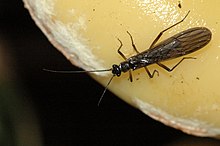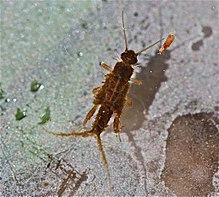Nemouridae
| Nemouridae | |
|---|---|
 | |
| Nemoura cinerea | |
| Scientific classification | |
| Domain: | Eukaryota |
| Kingdom: | Animalia |
| Phylum: | Arthropoda |
| Class: | Insecta |
| Cohort: | Polyneoptera |
| Order: | Plecoptera |
| Superfamily: | Nemouroidea |
| Family: | Nemouridae |

The Nemouridae are a family of stoneflies containing more than 700 described species, occurring primarily in the Holarctic region.[1][2] Members of this family are commonly known as spring stoneflies or brown stoneflies. Fly fishermen often refer to these insects as tiny winter blacks.
Although these insects use a wide range of flowing-water habitats, they tend to be most prevalent in smaller streams. The nymphs are distinctive, being broad-bodied and bristly with divergent wing pads.
Subfamilies and genera
[edit]The Plecoptera species file lists:[2][3]
Amphinemurinae
[edit]Authority: Baumann, 1975
- Amphinemura Ris, 1902
- Indonemoura Baumann, 1975
- Malenka (insect) Ricker, 1952
- Mesonemoura Baumann, 1975
- Protonemura Kempny, 1898
- Sphaeronemoura Shimizu & Sivec, 2001
- Tominemoura Sivec & Stark, 2009
Authority: Billberg, 1820
- genus group Nemoura
- Illiesonemoura Baumann, 1975
- Nemoura Latreille, 1796
- Sinonemura Mo, Li & Murányi, 2020
- Zapada Ricker, 1952
- other genera:
- †Balticonemoura Chen, 2021
- Lednia Ricker, 1952
- Nanonemoura Baumann & Fiala, 2001
- Nemurella Kempny, 1898
- Ostrocerca Ricker, 1952
- Paranemoura Needham & Claassen, 1925
- Podmosta Ricker, 1952
- Prostoia Ricker, 1952
- Shipsa Ricker, 1952
- Soyedina Ricker, 1952
- Visoka Ricker, 1952
References
[edit]- ^ Nelson, C. Riley. 1996. Nemouridae. Version 1 January 1996 (under construction). http://tolweb.org/Nemouridae/13941/1996.01.01 in The Tree of Life Web Project, http://tolweb.org/
- ^ a b DeWalt, R.E.; Maehr, M.D.; Neu-Becker, U.; Stueber, G. (2019). "family Nemouridae". Plecoptera species file online, Version 5.0. Retrieved 26 June 2023.
- ^ "Nemouridae". GBIF. Retrieved 11 June 2019.


 French
French Deutsch
Deutsch